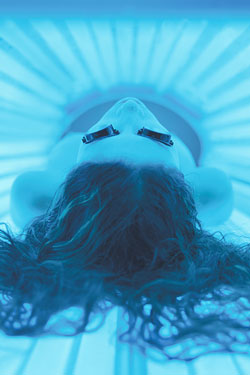Tanning Bed Users’ Brains Similar to Drug Addicts’, Study Finds

This is your brain ... on tanning beds?
A new study from UT Southwestern Medical Center has determined that people who frequently use tanning beds exhibit brain activity similar to that of a drug addict, Science Daily reports.
Though tanning beds have been proven to increase the risk of skin cancer, UV-users may be compelled to continue to hit the tanning salon by an "addictive neurological reward-and-reinforcement trigger," researchers say.
And to really put the "baked" in "faked and baked," the study—to be published in Addiction Biology—showed that the blood flow and brain activity from tanning bed fans were similar to those of people addicted to drugs and alcohol.
"Using tanning beds has rewarding effects in the brain so people may feel compelled to persist in the behavior even though it's bad for them," says Dr. Bryon Adinoff, professor of psychiatry and senior author of the study. "The implication is, 'If it's rewarding, then could it also be addictive?' It's an important question in the field."
The pilot study asked participants to use tanning beds on two separate occasions, one in which they were exposed to ultraviolet radiation, and another in which filters blocked the UV rays. The participants, who didn't know which bed had exposure, were asked about their willingness to go tanning again before and after each session. Participants' brain blood flow was also measured during their tanning sessions.
Want to play it safe? Try our top-rated self-tanners.















